HCA 104 Ethics Paper: A Case Study on Makayla Sault's Treatment
VerifiedAdded on 2023/06/04
|10
|3759
|400
Case Study
AI Summary
This case study examines the ethical considerations surrounding the case of Makayla Sault, an 11-year-old girl with acute lymphoblastic leukemia whose family chose traditional therapies over chemotherapy. The report delves into the four main principles of healthcare ethics: autonomy, beneficence, non-maleficence, and justice, and how they apply to Makayla's situation. It further explores ethical frameworks such as fairness, accountability, laws, standards, regulations, care, compassion, respect for the person, engagement, and empowerment, analyzing how these frameworks intersect with the legal and ethical dilemmas faced by healthcare professionals in respecting patient autonomy while ensuring their well-being. The case highlights the complexities of balancing medical best practices with patient rights and cultural beliefs, emphasizing the need for transparent and respectful communication between healthcare providers and patients' families. Desklib provides access to similar case studies and solved assignments for students.
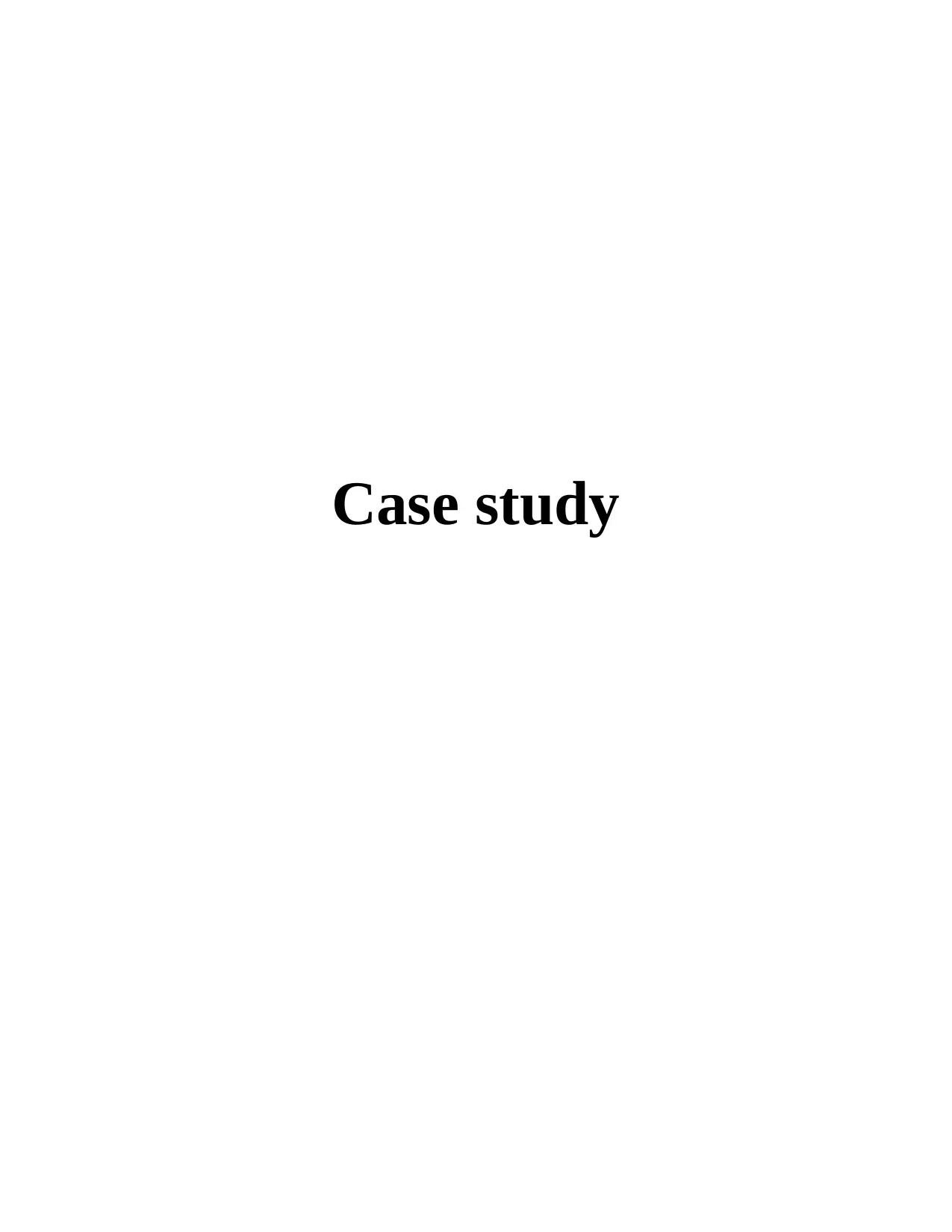
Case study
Paraphrase This Document
Need a fresh take? Get an instant paraphrase of this document with our AI Paraphraser
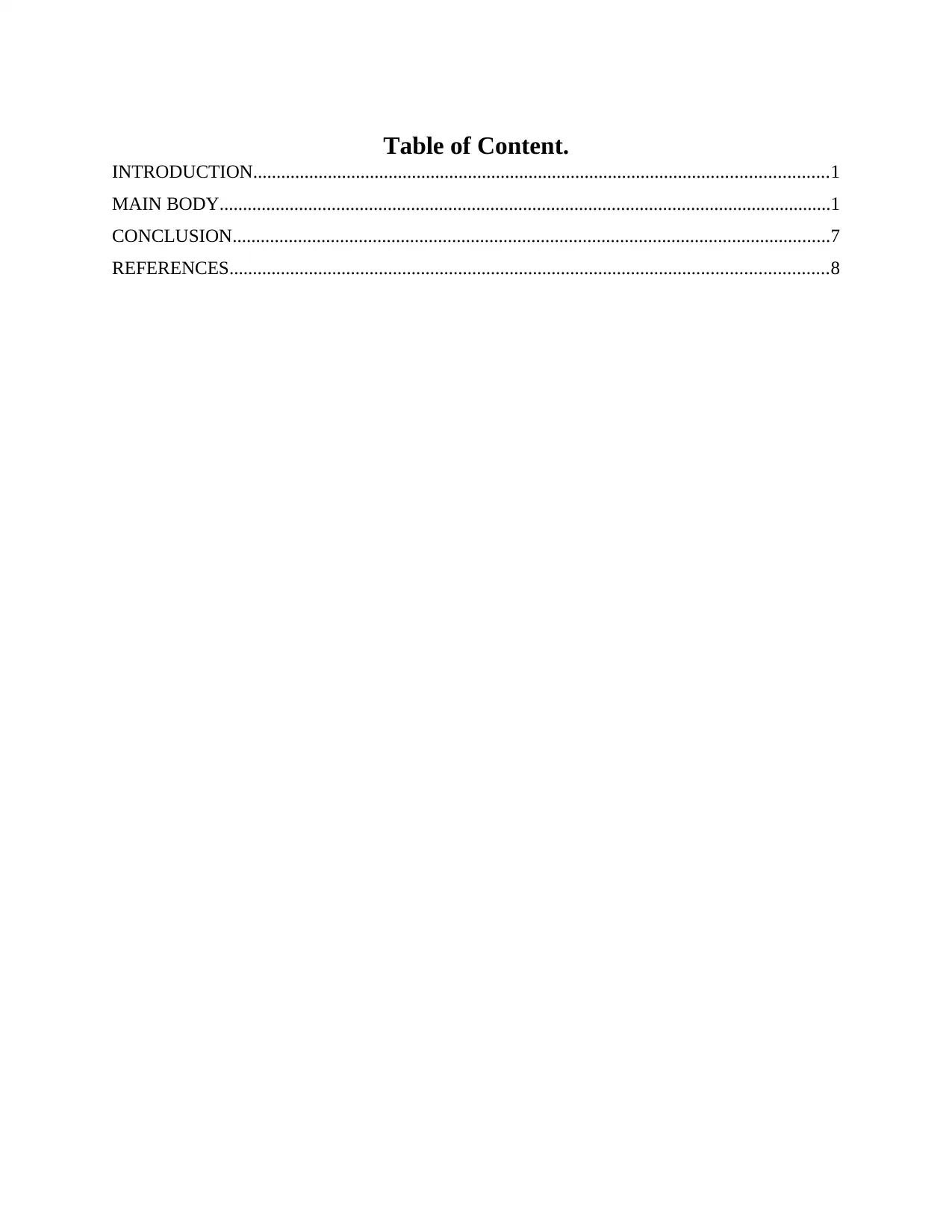
Table of Content.
INTRODUCTION...........................................................................................................................1
MAIN BODY...................................................................................................................................1
CONCLUSION................................................................................................................................7
REFERENCES................................................................................................................................8
INTRODUCTION...........................................................................................................................1
MAIN BODY...................................................................................................................................1
CONCLUSION................................................................................................................................7
REFERENCES................................................................................................................................8
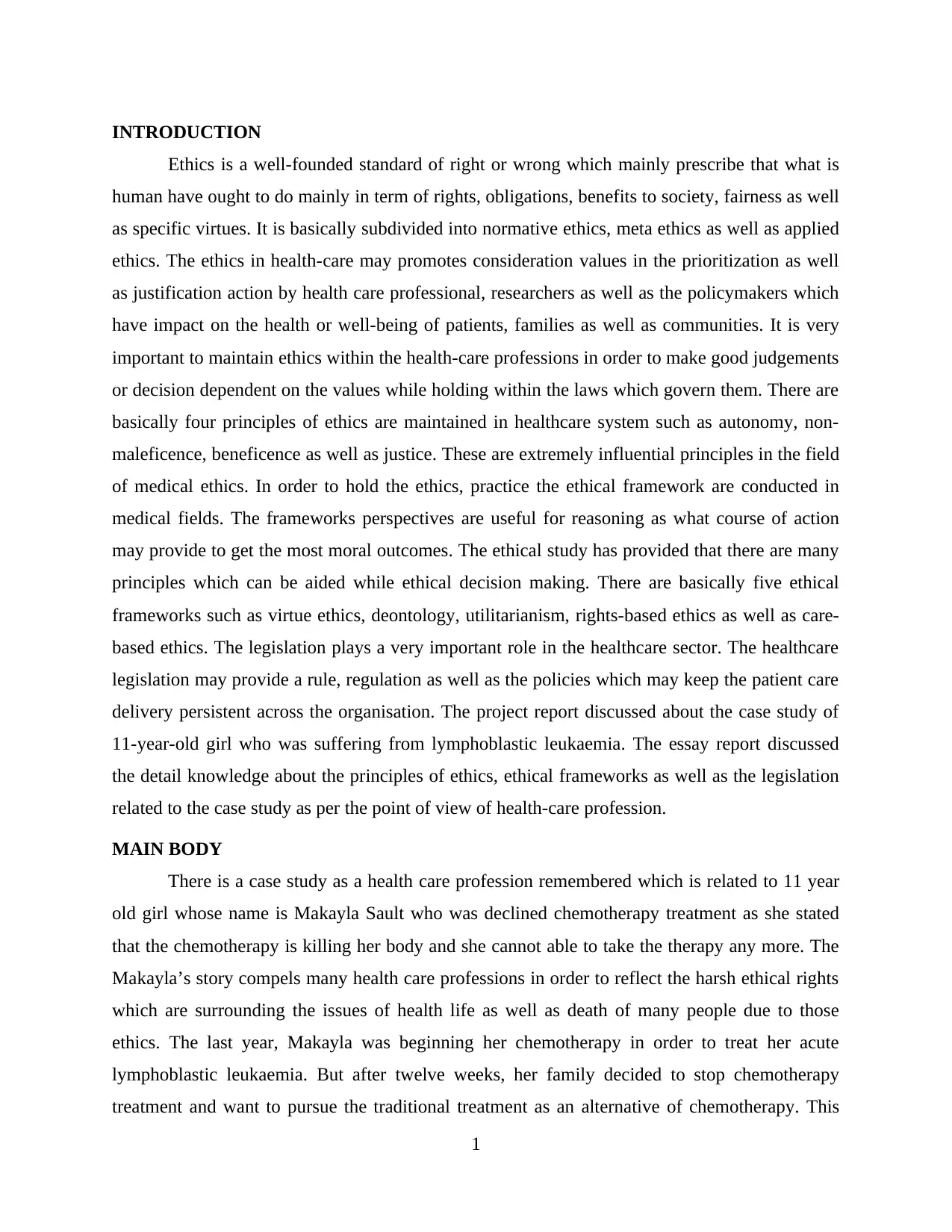
INTRODUCTION
Ethics is a well-founded standard of right or wrong which mainly prescribe that what is
human have ought to do mainly in term of rights, obligations, benefits to society, fairness as well
as specific virtues. It is basically subdivided into normative ethics, meta ethics as well as applied
ethics. The ethics in health-care may promotes consideration values in the prioritization as well
as justification action by health care professional, researchers as well as the policymakers which
have impact on the health or well-being of patients, families as well as communities. It is very
important to maintain ethics within the health-care professions in order to make good judgements
or decision dependent on the values while holding within the laws which govern them. There are
basically four principles of ethics are maintained in healthcare system such as autonomy, non-
maleficence, beneficence as well as justice. These are extremely influential principles in the field
of medical ethics. In order to hold the ethics, practice the ethical framework are conducted in
medical fields. The frameworks perspectives are useful for reasoning as what course of action
may provide to get the most moral outcomes. The ethical study has provided that there are many
principles which can be aided while ethical decision making. There are basically five ethical
frameworks such as virtue ethics, deontology, utilitarianism, rights-based ethics as well as care-
based ethics. The legislation plays a very important role in the healthcare sector. The healthcare
legislation may provide a rule, regulation as well as the policies which may keep the patient care
delivery persistent across the organisation. The project report discussed about the case study of
11-year-old girl who was suffering from lymphoblastic leukaemia. The essay report discussed
the detail knowledge about the principles of ethics, ethical frameworks as well as the legislation
related to the case study as per the point of view of health-care profession.
MAIN BODY
There is a case study as a health care profession remembered which is related to 11 year
old girl whose name is Makayla Sault who was declined chemotherapy treatment as she stated
that the chemotherapy is killing her body and she cannot able to take the therapy any more. The
Makayla’s story compels many health care professions in order to reflect the harsh ethical rights
which are surrounding the issues of health life as well as death of many people due to those
ethics. The last year, Makayla was beginning her chemotherapy in order to treat her acute
lymphoblastic leukaemia. But after twelve weeks, her family decided to stop chemotherapy
treatment and want to pursue the traditional treatment as an alternative of chemotherapy. This
1
Ethics is a well-founded standard of right or wrong which mainly prescribe that what is
human have ought to do mainly in term of rights, obligations, benefits to society, fairness as well
as specific virtues. It is basically subdivided into normative ethics, meta ethics as well as applied
ethics. The ethics in health-care may promotes consideration values in the prioritization as well
as justification action by health care professional, researchers as well as the policymakers which
have impact on the health or well-being of patients, families as well as communities. It is very
important to maintain ethics within the health-care professions in order to make good judgements
or decision dependent on the values while holding within the laws which govern them. There are
basically four principles of ethics are maintained in healthcare system such as autonomy, non-
maleficence, beneficence as well as justice. These are extremely influential principles in the field
of medical ethics. In order to hold the ethics, practice the ethical framework are conducted in
medical fields. The frameworks perspectives are useful for reasoning as what course of action
may provide to get the most moral outcomes. The ethical study has provided that there are many
principles which can be aided while ethical decision making. There are basically five ethical
frameworks such as virtue ethics, deontology, utilitarianism, rights-based ethics as well as care-
based ethics. The legislation plays a very important role in the healthcare sector. The healthcare
legislation may provide a rule, regulation as well as the policies which may keep the patient care
delivery persistent across the organisation. The project report discussed about the case study of
11-year-old girl who was suffering from lymphoblastic leukaemia. The essay report discussed
the detail knowledge about the principles of ethics, ethical frameworks as well as the legislation
related to the case study as per the point of view of health-care profession.
MAIN BODY
There is a case study as a health care profession remembered which is related to 11 year
old girl whose name is Makayla Sault who was declined chemotherapy treatment as she stated
that the chemotherapy is killing her body and she cannot able to take the therapy any more. The
Makayla’s story compels many health care professions in order to reflect the harsh ethical rights
which are surrounding the issues of health life as well as death of many people due to those
ethics. The last year, Makayla was beginning her chemotherapy in order to treat her acute
lymphoblastic leukaemia. But after twelve weeks, her family decided to stop chemotherapy
treatment and want to pursue the traditional treatment as an alternative of chemotherapy. This
1
⊘ This is a preview!⊘
Do you want full access?
Subscribe today to unlock all pages.

Trusted by 1+ million students worldwide
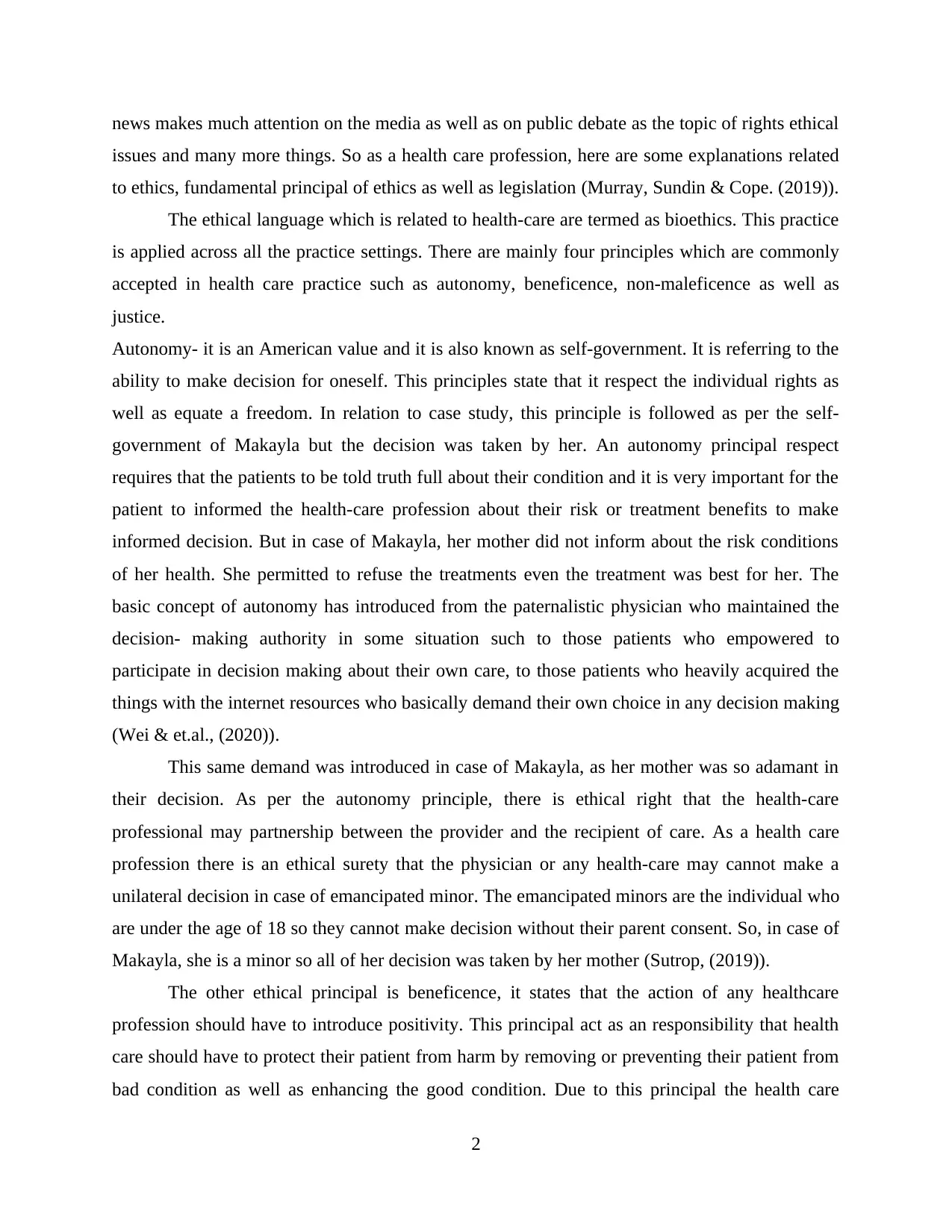
news makes much attention on the media as well as on public debate as the topic of rights ethical
issues and many more things. So as a health care profession, here are some explanations related
to ethics, fundamental principal of ethics as well as legislation (Murray, Sundin & Cope. (2019)).
The ethical language which is related to health-care are termed as bioethics. This practice
is applied across all the practice settings. There are mainly four principles which are commonly
accepted in health care practice such as autonomy, beneficence, non-maleficence as well as
justice.
Autonomy- it is an American value and it is also known as self-government. It is referring to the
ability to make decision for oneself. This principles state that it respect the individual rights as
well as equate a freedom. In relation to case study, this principle is followed as per the self-
government of Makayla but the decision was taken by her. An autonomy principal respect
requires that the patients to be told truth full about their condition and it is very important for the
patient to informed the health-care profession about their risk or treatment benefits to make
informed decision. But in case of Makayla, her mother did not inform about the risk conditions
of her health. She permitted to refuse the treatments even the treatment was best for her. The
basic concept of autonomy has introduced from the paternalistic physician who maintained the
decision- making authority in some situation such to those patients who empowered to
participate in decision making about their own care, to those patients who heavily acquired the
things with the internet resources who basically demand their own choice in any decision making
(Wei & et.al., (2020)).
This same demand was introduced in case of Makayla, as her mother was so adamant in
their decision. As per the autonomy principle, there is ethical right that the health-care
professional may partnership between the provider and the recipient of care. As a health care
profession there is an ethical surety that the physician or any health-care may cannot make a
unilateral decision in case of emancipated minor. The emancipated minors are the individual who
are under the age of 18 so they cannot make decision without their parent consent. So, in case of
Makayla, she is a minor so all of her decision was taken by her mother (Sutrop, (2019)).
The other ethical principal is beneficence, it states that the action of any healthcare
profession should have to introduce positivity. This principal act as an responsibility that health
care should have to protect their patient from harm by removing or preventing their patient from
bad condition as well as enhancing the good condition. Due to this principal the health care
2
issues and many more things. So as a health care profession, here are some explanations related
to ethics, fundamental principal of ethics as well as legislation (Murray, Sundin & Cope. (2019)).
The ethical language which is related to health-care are termed as bioethics. This practice
is applied across all the practice settings. There are mainly four principles which are commonly
accepted in health care practice such as autonomy, beneficence, non-maleficence as well as
justice.
Autonomy- it is an American value and it is also known as self-government. It is referring to the
ability to make decision for oneself. This principles state that it respect the individual rights as
well as equate a freedom. In relation to case study, this principle is followed as per the self-
government of Makayla but the decision was taken by her. An autonomy principal respect
requires that the patients to be told truth full about their condition and it is very important for the
patient to informed the health-care profession about their risk or treatment benefits to make
informed decision. But in case of Makayla, her mother did not inform about the risk conditions
of her health. She permitted to refuse the treatments even the treatment was best for her. The
basic concept of autonomy has introduced from the paternalistic physician who maintained the
decision- making authority in some situation such to those patients who empowered to
participate in decision making about their own care, to those patients who heavily acquired the
things with the internet resources who basically demand their own choice in any decision making
(Wei & et.al., (2020)).
This same demand was introduced in case of Makayla, as her mother was so adamant in
their decision. As per the autonomy principle, there is ethical right that the health-care
professional may partnership between the provider and the recipient of care. As a health care
profession there is an ethical surety that the physician or any health-care may cannot make a
unilateral decision in case of emancipated minor. The emancipated minors are the individual who
are under the age of 18 so they cannot make decision without their parent consent. So, in case of
Makayla, she is a minor so all of her decision was taken by her mother (Sutrop, (2019)).
The other ethical principal is beneficence, it states that the action of any healthcare
profession should have to introduce positivity. This principal act as an responsibility that health
care should have to protect their patient from harm by removing or preventing their patient from
bad condition as well as enhancing the good condition. Due to this principal the health care
2
Paraphrase This Document
Need a fresh take? Get an instant paraphrase of this document with our AI Paraphraser
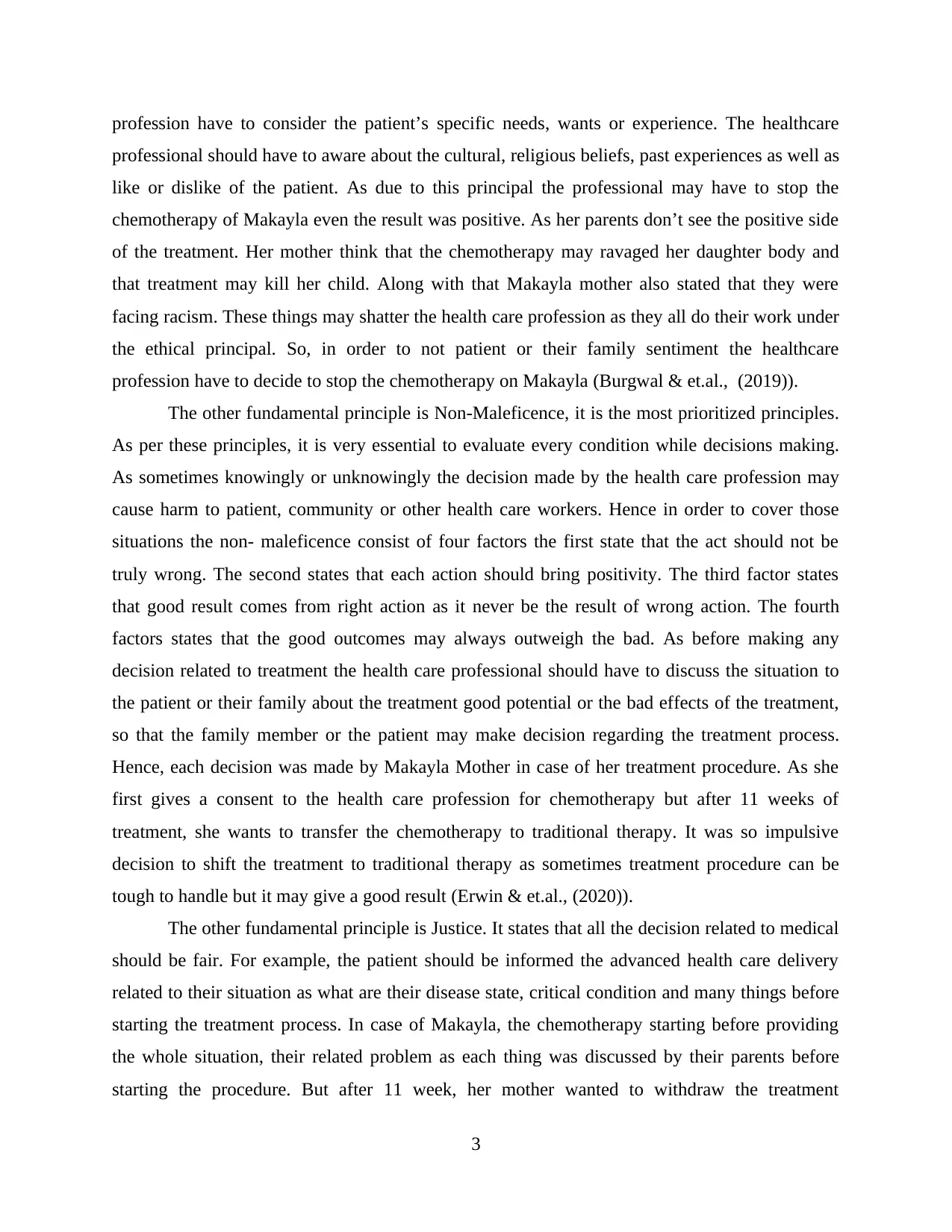
profession have to consider the patient’s specific needs, wants or experience. The healthcare
professional should have to aware about the cultural, religious beliefs, past experiences as well as
like or dislike of the patient. As due to this principal the professional may have to stop the
chemotherapy of Makayla even the result was positive. As her parents don’t see the positive side
of the treatment. Her mother think that the chemotherapy may ravaged her daughter body and
that treatment may kill her child. Along with that Makayla mother also stated that they were
facing racism. These things may shatter the health care profession as they all do their work under
the ethical principal. So, in order to not patient or their family sentiment the healthcare
profession have to decide to stop the chemotherapy on Makayla (Burgwal & et.al., (2019)).
The other fundamental principle is Non-Maleficence, it is the most prioritized principles.
As per these principles, it is very essential to evaluate every condition while decisions making.
As sometimes knowingly or unknowingly the decision made by the health care profession may
cause harm to patient, community or other health care workers. Hence in order to cover those
situations the non- maleficence consist of four factors the first state that the act should not be
truly wrong. The second states that each action should bring positivity. The third factor states
that good result comes from right action as it never be the result of wrong action. The fourth
factors states that the good outcomes may always outweigh the bad. As before making any
decision related to treatment the health care professional should have to discuss the situation to
the patient or their family about the treatment good potential or the bad effects of the treatment,
so that the family member or the patient may make decision regarding the treatment process.
Hence, each decision was made by Makayla Mother in case of her treatment procedure. As she
first gives a consent to the health care profession for chemotherapy but after 11 weeks of
treatment, she wants to transfer the chemotherapy to traditional therapy. It was so impulsive
decision to shift the treatment to traditional therapy as sometimes treatment procedure can be
tough to handle but it may give a good result (Erwin & et.al., (2020)).
The other fundamental principle is Justice. It states that all the decision related to medical
should be fair. For example, the patient should be informed the advanced health care delivery
related to their situation as what are their disease state, critical condition and many things before
starting the treatment process. In case of Makayla, the chemotherapy starting before providing
the whole situation, their related problem as each thing was discussed by their parents before
starting the procedure. But after 11 week, her mother wanted to withdraw the treatment
3
professional should have to aware about the cultural, religious beliefs, past experiences as well as
like or dislike of the patient. As due to this principal the professional may have to stop the
chemotherapy of Makayla even the result was positive. As her parents don’t see the positive side
of the treatment. Her mother think that the chemotherapy may ravaged her daughter body and
that treatment may kill her child. Along with that Makayla mother also stated that they were
facing racism. These things may shatter the health care profession as they all do their work under
the ethical principal. So, in order to not patient or their family sentiment the healthcare
profession have to decide to stop the chemotherapy on Makayla (Burgwal & et.al., (2019)).
The other fundamental principle is Non-Maleficence, it is the most prioritized principles.
As per these principles, it is very essential to evaluate every condition while decisions making.
As sometimes knowingly or unknowingly the decision made by the health care profession may
cause harm to patient, community or other health care workers. Hence in order to cover those
situations the non- maleficence consist of four factors the first state that the act should not be
truly wrong. The second states that each action should bring positivity. The third factor states
that good result comes from right action as it never be the result of wrong action. The fourth
factors states that the good outcomes may always outweigh the bad. As before making any
decision related to treatment the health care professional should have to discuss the situation to
the patient or their family about the treatment good potential or the bad effects of the treatment,
so that the family member or the patient may make decision regarding the treatment process.
Hence, each decision was made by Makayla Mother in case of her treatment procedure. As she
first gives a consent to the health care profession for chemotherapy but after 11 weeks of
treatment, she wants to transfer the chemotherapy to traditional therapy. It was so impulsive
decision to shift the treatment to traditional therapy as sometimes treatment procedure can be
tough to handle but it may give a good result (Erwin & et.al., (2020)).
The other fundamental principle is Justice. It states that all the decision related to medical
should be fair. For example, the patient should be informed the advanced health care delivery
related to their situation as what are their disease state, critical condition and many things before
starting the treatment process. In case of Makayla, the chemotherapy starting before providing
the whole situation, their related problem as each thing was discussed by their parents before
starting the procedure. But after 11 week, her mother wanted to withdraw the treatment
3
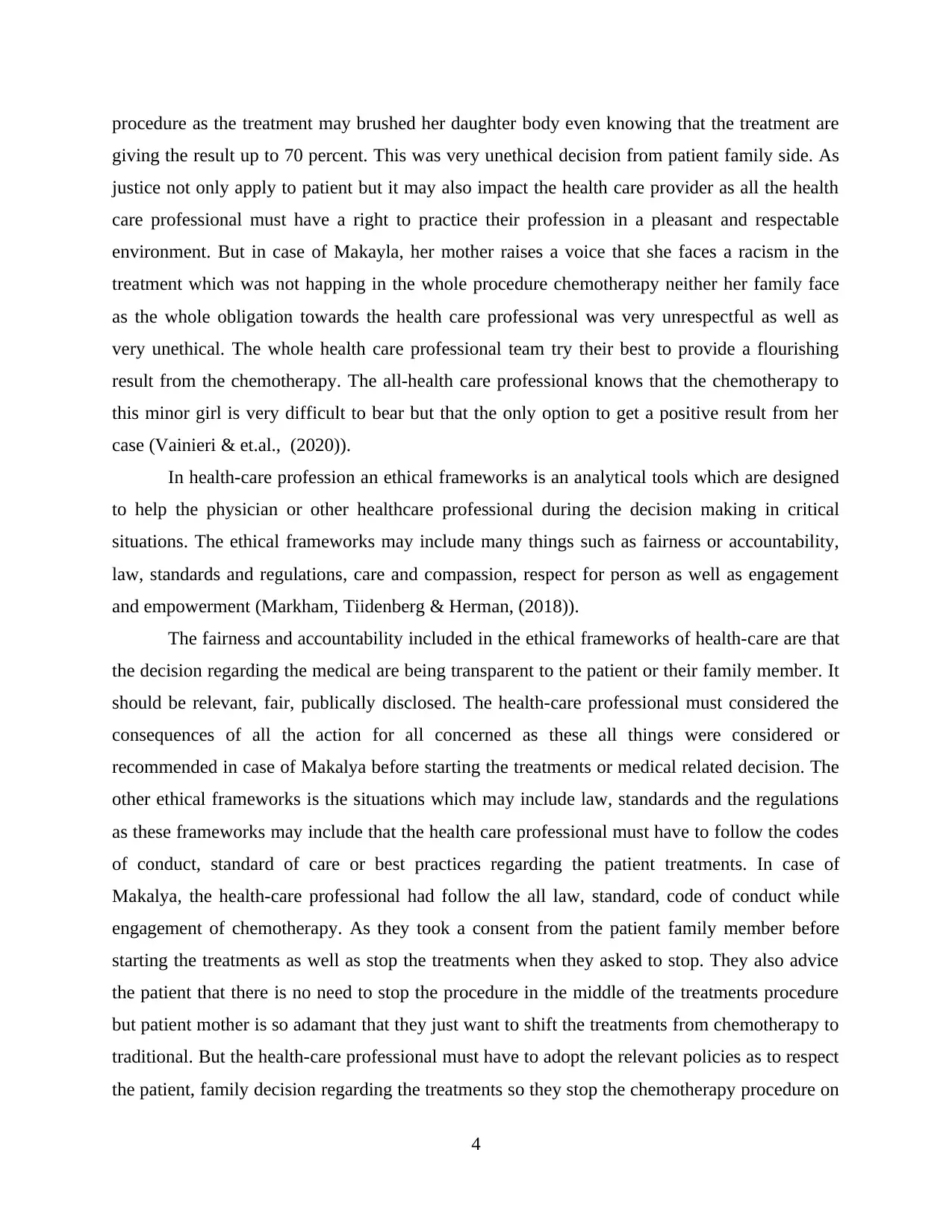
procedure as the treatment may brushed her daughter body even knowing that the treatment are
giving the result up to 70 percent. This was very unethical decision from patient family side. As
justice not only apply to patient but it may also impact the health care provider as all the health
care professional must have a right to practice their profession in a pleasant and respectable
environment. But in case of Makayla, her mother raises a voice that she faces a racism in the
treatment which was not happing in the whole procedure chemotherapy neither her family face
as the whole obligation towards the health care professional was very unrespectful as well as
very unethical. The whole health care professional team try their best to provide a flourishing
result from the chemotherapy. The all-health care professional knows that the chemotherapy to
this minor girl is very difficult to bear but that the only option to get a positive result from her
case (Vainieri & et.al., (2020)).
In health-care profession an ethical frameworks is an analytical tools which are designed
to help the physician or other healthcare professional during the decision making in critical
situations. The ethical frameworks may include many things such as fairness or accountability,
law, standards and regulations, care and compassion, respect for person as well as engagement
and empowerment (Markham, Tiidenberg & Herman, (2018)).
The fairness and accountability included in the ethical frameworks of health-care are that
the decision regarding the medical are being transparent to the patient or their family member. It
should be relevant, fair, publically disclosed. The health-care professional must considered the
consequences of all the action for all concerned as these all things were considered or
recommended in case of Makalya before starting the treatments or medical related decision. The
other ethical frameworks is the situations which may include law, standards and the regulations
as these frameworks may include that the health care professional must have to follow the codes
of conduct, standard of care or best practices regarding the patient treatments. In case of
Makalya, the health-care professional had follow the all law, standard, code of conduct while
engagement of chemotherapy. As they took a consent from the patient family member before
starting the treatments as well as stop the treatments when they asked to stop. They also advice
the patient that there is no need to stop the procedure in the middle of the treatments procedure
but patient mother is so adamant that they just want to shift the treatments from chemotherapy to
traditional. But the health-care professional must have to adopt the relevant policies as to respect
the patient, family decision regarding the treatments so they stop the chemotherapy procedure on
4
giving the result up to 70 percent. This was very unethical decision from patient family side. As
justice not only apply to patient but it may also impact the health care provider as all the health
care professional must have a right to practice their profession in a pleasant and respectable
environment. But in case of Makayla, her mother raises a voice that she faces a racism in the
treatment which was not happing in the whole procedure chemotherapy neither her family face
as the whole obligation towards the health care professional was very unrespectful as well as
very unethical. The whole health care professional team try their best to provide a flourishing
result from the chemotherapy. The all-health care professional knows that the chemotherapy to
this minor girl is very difficult to bear but that the only option to get a positive result from her
case (Vainieri & et.al., (2020)).
In health-care profession an ethical frameworks is an analytical tools which are designed
to help the physician or other healthcare professional during the decision making in critical
situations. The ethical frameworks may include many things such as fairness or accountability,
law, standards and regulations, care and compassion, respect for person as well as engagement
and empowerment (Markham, Tiidenberg & Herman, (2018)).
The fairness and accountability included in the ethical frameworks of health-care are that
the decision regarding the medical are being transparent to the patient or their family member. It
should be relevant, fair, publically disclosed. The health-care professional must considered the
consequences of all the action for all concerned as these all things were considered or
recommended in case of Makalya before starting the treatments or medical related decision. The
other ethical frameworks is the situations which may include law, standards and the regulations
as these frameworks may include that the health care professional must have to follow the codes
of conduct, standard of care or best practices regarding the patient treatments. In case of
Makalya, the health-care professional had follow the all law, standard, code of conduct while
engagement of chemotherapy. As they took a consent from the patient family member before
starting the treatments as well as stop the treatments when they asked to stop. They also advice
the patient that there is no need to stop the procedure in the middle of the treatments procedure
but patient mother is so adamant that they just want to shift the treatments from chemotherapy to
traditional. But the health-care professional must have to adopt the relevant policies as to respect
the patient, family decision regarding the treatments so they stop the chemotherapy procedure on
4
⊘ This is a preview!⊘
Do you want full access?
Subscribe today to unlock all pages.

Trusted by 1+ million students worldwide
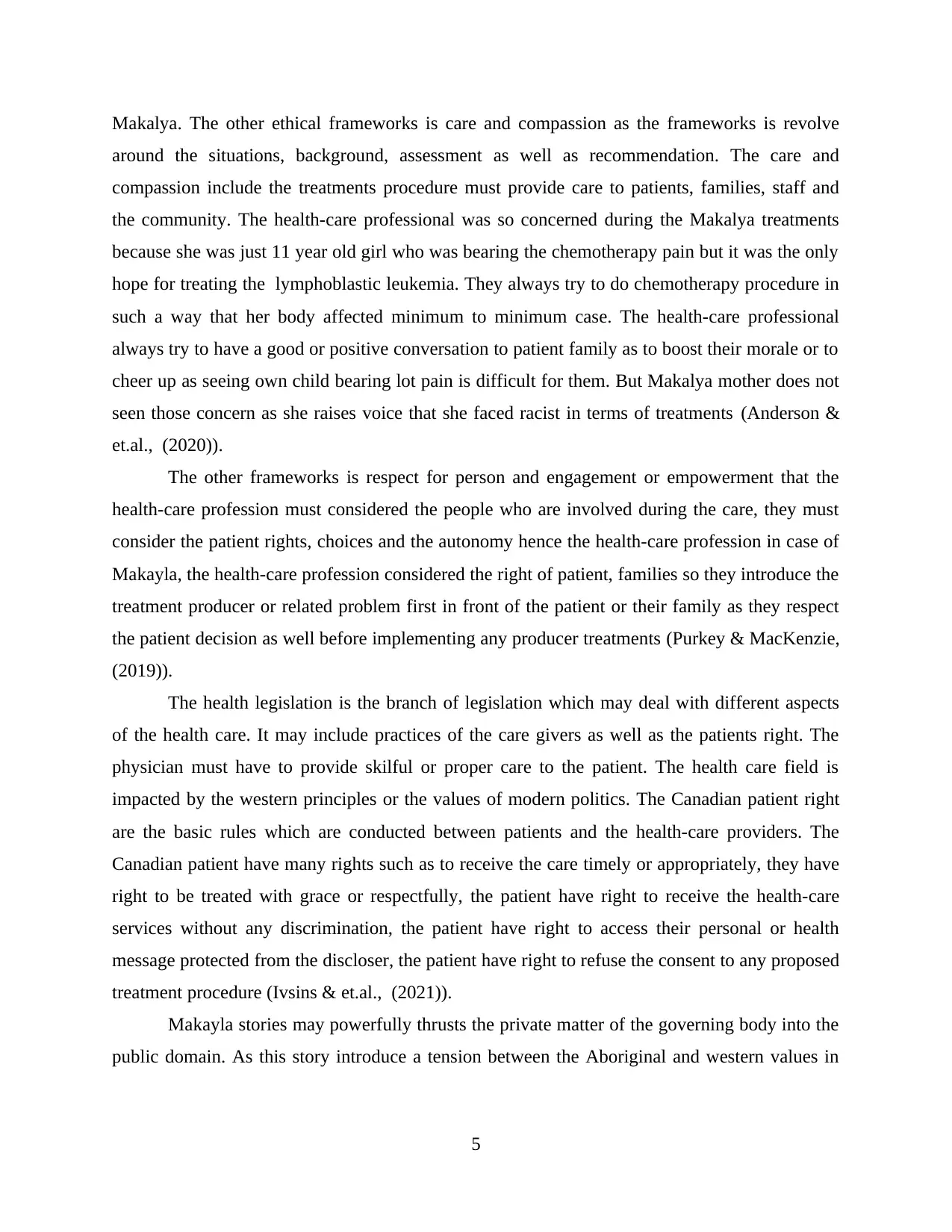
Makalya. The other ethical frameworks is care and compassion as the frameworks is revolve
around the situations, background, assessment as well as recommendation. The care and
compassion include the treatments procedure must provide care to patients, families, staff and
the community. The health-care professional was so concerned during the Makalya treatments
because she was just 11 year old girl who was bearing the chemotherapy pain but it was the only
hope for treating the lymphoblastic leukemia. They always try to do chemotherapy procedure in
such a way that her body affected minimum to minimum case. The health-care professional
always try to have a good or positive conversation to patient family as to boost their morale or to
cheer up as seeing own child bearing lot pain is difficult for them. But Makalya mother does not
seen those concern as she raises voice that she faced racist in terms of treatments (Anderson &
et.al., (2020)).
The other frameworks is respect for person and engagement or empowerment that the
health-care profession must considered the people who are involved during the care, they must
consider the patient rights, choices and the autonomy hence the health-care profession in case of
Makayla, the health-care profession considered the right of patient, families so they introduce the
treatment producer or related problem first in front of the patient or their family as they respect
the patient decision as well before implementing any producer treatments (Purkey & MacKenzie,
(2019)).
The health legislation is the branch of legislation which may deal with different aspects
of the health care. It may include practices of the care givers as well as the patients right. The
physician must have to provide skilful or proper care to the patient. The health care field is
impacted by the western principles or the values of modern politics. The Canadian patient right
are the basic rules which are conducted between patients and the health-care providers. The
Canadian patient have many rights such as to receive the care timely or appropriately, they have
right to be treated with grace or respectfully, the patient have right to receive the health-care
services without any discrimination, the patient have right to access their personal or health
message protected from the discloser, the patient have right to refuse the consent to any proposed
treatment procedure (Ivsins & et.al., (2021)).
Makayla stories may powerfully thrusts the private matter of the governing body into the
public domain. As this story introduce a tension between the Aboriginal and western values in
5
around the situations, background, assessment as well as recommendation. The care and
compassion include the treatments procedure must provide care to patients, families, staff and
the community. The health-care professional was so concerned during the Makalya treatments
because she was just 11 year old girl who was bearing the chemotherapy pain but it was the only
hope for treating the lymphoblastic leukemia. They always try to do chemotherapy procedure in
such a way that her body affected minimum to minimum case. The health-care professional
always try to have a good or positive conversation to patient family as to boost their morale or to
cheer up as seeing own child bearing lot pain is difficult for them. But Makalya mother does not
seen those concern as she raises voice that she faced racist in terms of treatments (Anderson &
et.al., (2020)).
The other frameworks is respect for person and engagement or empowerment that the
health-care profession must considered the people who are involved during the care, they must
consider the patient rights, choices and the autonomy hence the health-care profession in case of
Makayla, the health-care profession considered the right of patient, families so they introduce the
treatment producer or related problem first in front of the patient or their family as they respect
the patient decision as well before implementing any producer treatments (Purkey & MacKenzie,
(2019)).
The health legislation is the branch of legislation which may deal with different aspects
of the health care. It may include practices of the care givers as well as the patients right. The
physician must have to provide skilful or proper care to the patient. The health care field is
impacted by the western principles or the values of modern politics. The Canadian patient right
are the basic rules which are conducted between patients and the health-care providers. The
Canadian patient have many rights such as to receive the care timely or appropriately, they have
right to be treated with grace or respectfully, the patient have right to receive the health-care
services without any discrimination, the patient have right to access their personal or health
message protected from the discloser, the patient have right to refuse the consent to any proposed
treatment procedure (Ivsins & et.al., (2021)).
Makayla stories may powerfully thrusts the private matter of the governing body into the
public domain. As this story introduce a tension between the Aboriginal and western values in
5
Paraphrase This Document
Need a fresh take? Get an instant paraphrase of this document with our AI Paraphraser
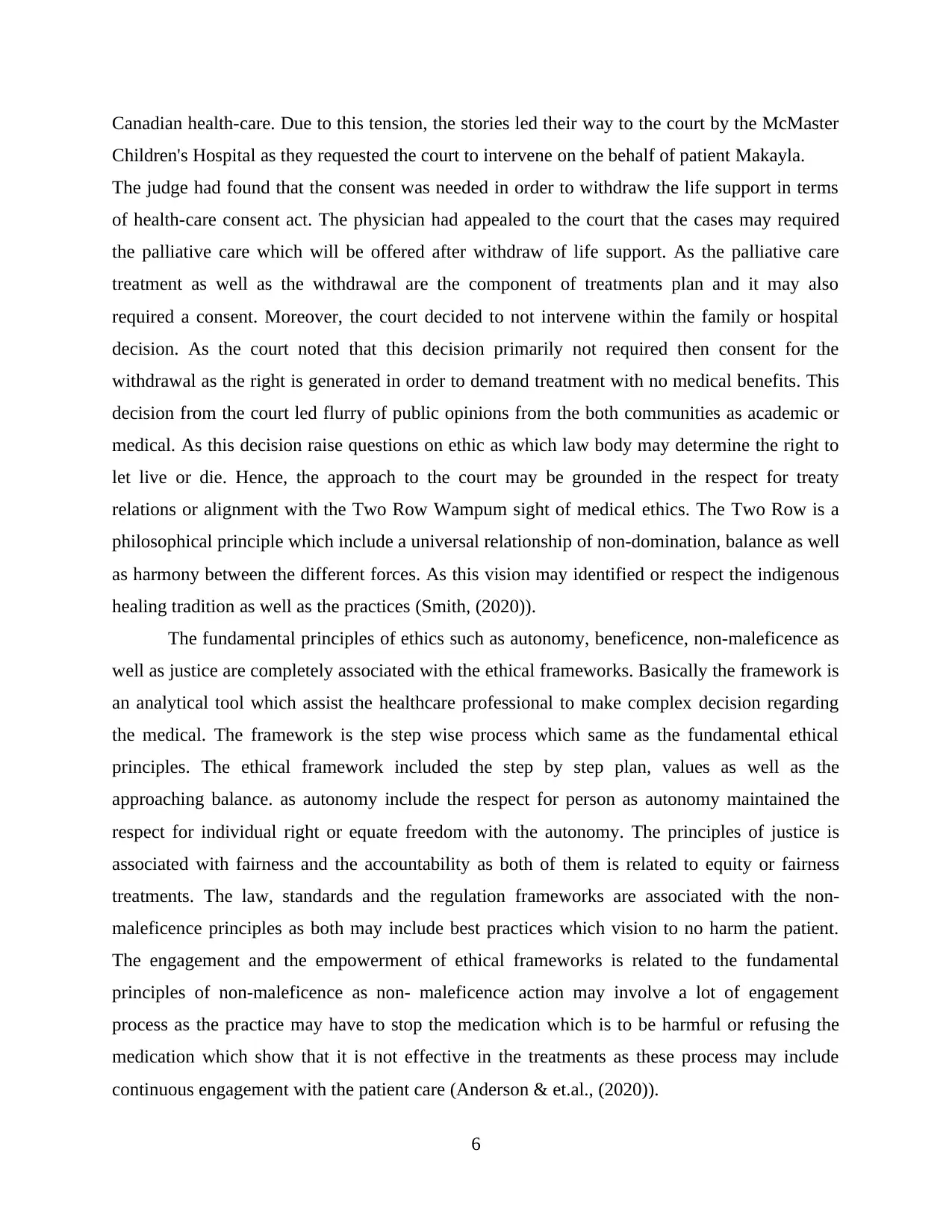
Canadian health-care. Due to this tension, the stories led their way to the court by the McMaster
Children's Hospital as they requested the court to intervene on the behalf of patient Makayla.
The judge had found that the consent was needed in order to withdraw the life support in terms
of health-care consent act. The physician had appealed to the court that the cases may required
the palliative care which will be offered after withdraw of life support. As the palliative care
treatment as well as the withdrawal are the component of treatments plan and it may also
required a consent. Moreover, the court decided to not intervene within the family or hospital
decision. As the court noted that this decision primarily not required then consent for the
withdrawal as the right is generated in order to demand treatment with no medical benefits. This
decision from the court led flurry of public opinions from the both communities as academic or
medical. As this decision raise questions on ethic as which law body may determine the right to
let live or die. Hence, the approach to the court may be grounded in the respect for treaty
relations or alignment with the Two Row Wampum sight of medical ethics. The Two Row is a
philosophical principle which include a universal relationship of non-domination, balance as well
as harmony between the different forces. As this vision may identified or respect the indigenous
healing tradition as well as the practices (Smith, (2020)).
The fundamental principles of ethics such as autonomy, beneficence, non-maleficence as
well as justice are completely associated with the ethical frameworks. Basically the framework is
an analytical tool which assist the healthcare professional to make complex decision regarding
the medical. The framework is the step wise process which same as the fundamental ethical
principles. The ethical framework included the step by step plan, values as well as the
approaching balance. as autonomy include the respect for person as autonomy maintained the
respect for individual right or equate freedom with the autonomy. The principles of justice is
associated with fairness and the accountability as both of them is related to equity or fairness
treatments. The law, standards and the regulation frameworks are associated with the non-
maleficence principles as both may include best practices which vision to no harm the patient.
The engagement and the empowerment of ethical frameworks is related to the fundamental
principles of non-maleficence as non- maleficence action may involve a lot of engagement
process as the practice may have to stop the medication which is to be harmful or refusing the
medication which show that it is not effective in the treatments as these process may include
continuous engagement with the patient care (Anderson & et.al., (2020)).
6
Children's Hospital as they requested the court to intervene on the behalf of patient Makayla.
The judge had found that the consent was needed in order to withdraw the life support in terms
of health-care consent act. The physician had appealed to the court that the cases may required
the palliative care which will be offered after withdraw of life support. As the palliative care
treatment as well as the withdrawal are the component of treatments plan and it may also
required a consent. Moreover, the court decided to not intervene within the family or hospital
decision. As the court noted that this decision primarily not required then consent for the
withdrawal as the right is generated in order to demand treatment with no medical benefits. This
decision from the court led flurry of public opinions from the both communities as academic or
medical. As this decision raise questions on ethic as which law body may determine the right to
let live or die. Hence, the approach to the court may be grounded in the respect for treaty
relations or alignment with the Two Row Wampum sight of medical ethics. The Two Row is a
philosophical principle which include a universal relationship of non-domination, balance as well
as harmony between the different forces. As this vision may identified or respect the indigenous
healing tradition as well as the practices (Smith, (2020)).
The fundamental principles of ethics such as autonomy, beneficence, non-maleficence as
well as justice are completely associated with the ethical frameworks. Basically the framework is
an analytical tool which assist the healthcare professional to make complex decision regarding
the medical. The framework is the step wise process which same as the fundamental ethical
principles. The ethical framework included the step by step plan, values as well as the
approaching balance. as autonomy include the respect for person as autonomy maintained the
respect for individual right or equate freedom with the autonomy. The principles of justice is
associated with fairness and the accountability as both of them is related to equity or fairness
treatments. The law, standards and the regulation frameworks are associated with the non-
maleficence principles as both may include best practices which vision to no harm the patient.
The engagement and the empowerment of ethical frameworks is related to the fundamental
principles of non-maleficence as non- maleficence action may involve a lot of engagement
process as the practice may have to stop the medication which is to be harmful or refusing the
medication which show that it is not effective in the treatments as these process may include
continuous engagement with the patient care (Anderson & et.al., (2020)).
6
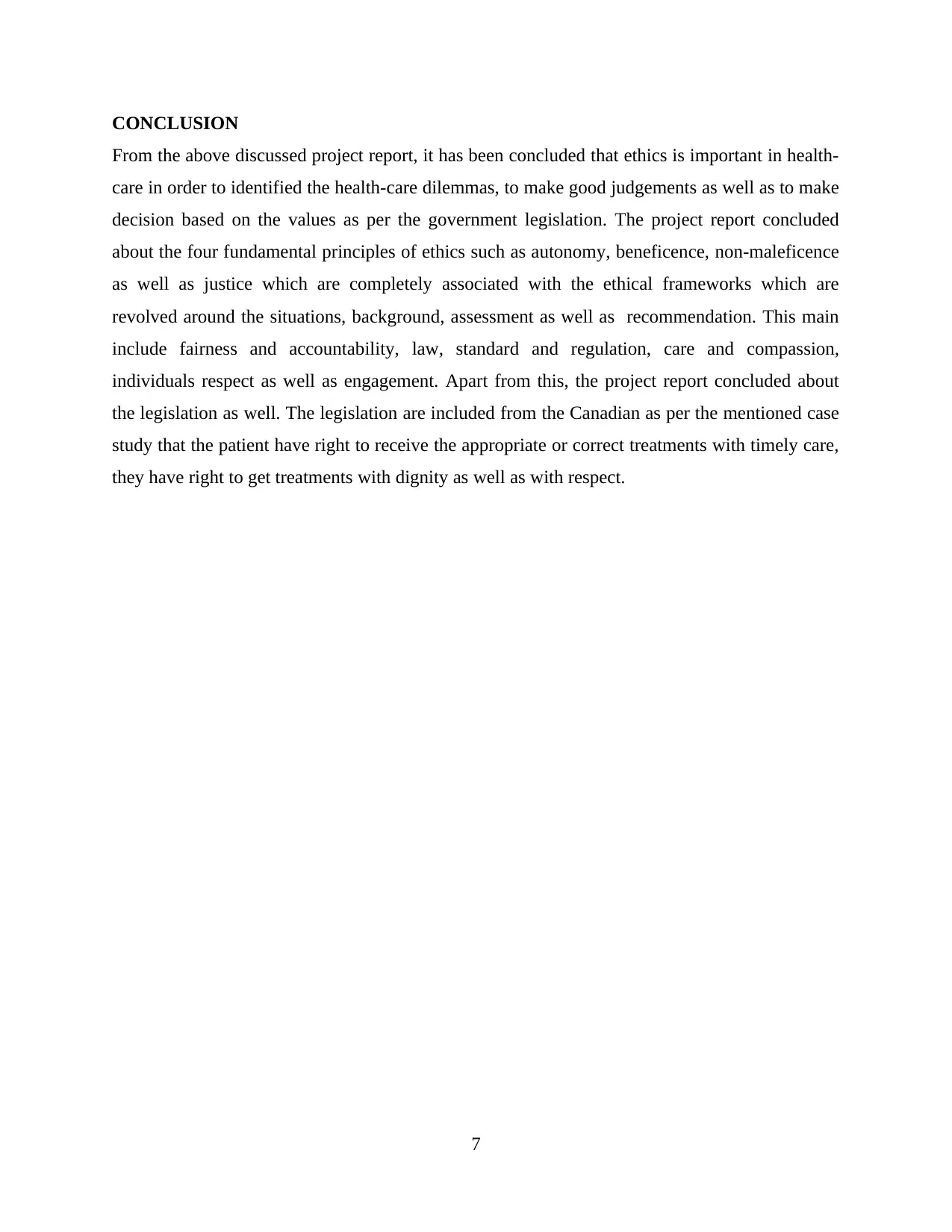
CONCLUSION
From the above discussed project report, it has been concluded that ethics is important in health-
care in order to identified the health-care dilemmas, to make good judgements as well as to make
decision based on the values as per the government legislation. The project report concluded
about the four fundamental principles of ethics such as autonomy, beneficence, non-maleficence
as well as justice which are completely associated with the ethical frameworks which are
revolved around the situations, background, assessment as well as recommendation. This main
include fairness and accountability, law, standard and regulation, care and compassion,
individuals respect as well as engagement. Apart from this, the project report concluded about
the legislation as well. The legislation are included from the Canadian as per the mentioned case
study that the patient have right to receive the appropriate or correct treatments with timely care,
they have right to get treatments with dignity as well as with respect.
7
From the above discussed project report, it has been concluded that ethics is important in health-
care in order to identified the health-care dilemmas, to make good judgements as well as to make
decision based on the values as per the government legislation. The project report concluded
about the four fundamental principles of ethics such as autonomy, beneficence, non-maleficence
as well as justice which are completely associated with the ethical frameworks which are
revolved around the situations, background, assessment as well as recommendation. This main
include fairness and accountability, law, standard and regulation, care and compassion,
individuals respect as well as engagement. Apart from this, the project report concluded about
the legislation as well. The legislation are included from the Canadian as per the mentioned case
study that the patient have right to receive the appropriate or correct treatments with timely care,
they have right to get treatments with dignity as well as with respect.
7
⊘ This is a preview!⊘
Do you want full access?
Subscribe today to unlock all pages.

Trusted by 1+ million students worldwide
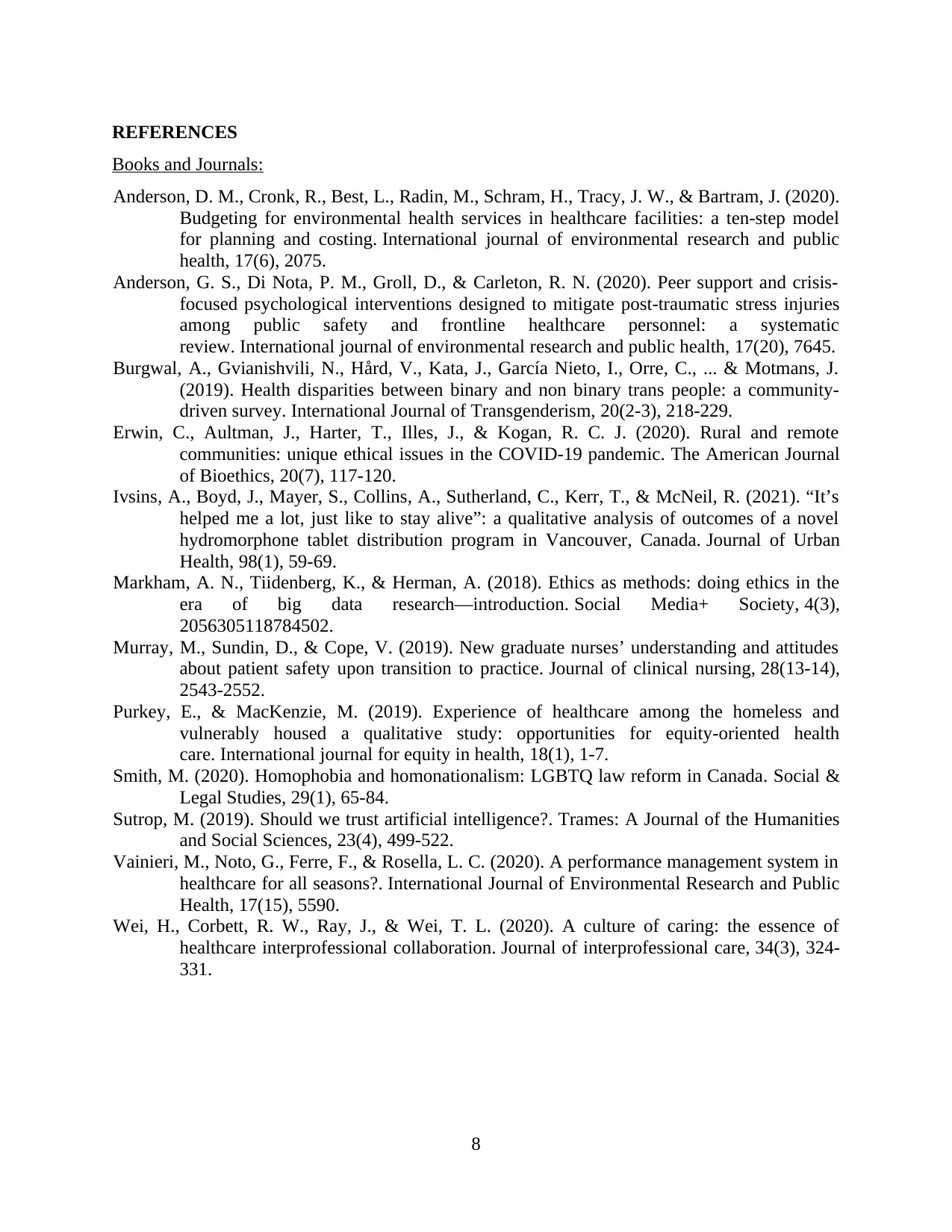
REFERENCES
Books and Journals:
Anderson, D. M., Cronk, R., Best, L., Radin, M., Schram, H., Tracy, J. W., & Bartram, J. (2020).
Budgeting for environmental health services in healthcare facilities: a ten-step model
for planning and costing. International journal of environmental research and public
health, 17(6), 2075.
Anderson, G. S., Di Nota, P. M., Groll, D., & Carleton, R. N. (2020). Peer support and crisis-
focused psychological interventions designed to mitigate post-traumatic stress injuries
among public safety and frontline healthcare personnel: a systematic
review. International journal of environmental research and public health, 17(20), 7645.
Burgwal, A., Gvianishvili, N., Hård, V., Kata, J., García Nieto, I., Orre, C., ... & Motmans, J.
(2019). Health disparities between binary and non binary trans people: a community-
driven survey. International Journal of Transgenderism, 20(2-3), 218-229.
Erwin, C., Aultman, J., Harter, T., Illes, J., & Kogan, R. C. J. (2020). Rural and remote
communities: unique ethical issues in the COVID-19 pandemic. The American Journal
of Bioethics, 20(7), 117-120.
Ivsins, A., Boyd, J., Mayer, S., Collins, A., Sutherland, C., Kerr, T., & McNeil, R. (2021). “It’s
helped me a lot, just like to stay alive”: a qualitative analysis of outcomes of a novel
hydromorphone tablet distribution program in Vancouver, Canada. Journal of Urban
Health, 98(1), 59-69.
Markham, A. N., Tiidenberg, K., & Herman, A. (2018). Ethics as methods: doing ethics in the
era of big data research—introduction. Social Media+ Society, 4(3),
2056305118784502.
Murray, M., Sundin, D., & Cope, V. (2019). New graduate nurses’ understanding and attitudes
about patient safety upon transition to practice. Journal of clinical nursing, 28(13-14),
2543-2552.
Purkey, E., & MacKenzie, M. (2019). Experience of healthcare among the homeless and
vulnerably housed a qualitative study: opportunities for equity-oriented health
care. International journal for equity in health, 18(1), 1-7.
Smith, M. (2020). Homophobia and homonationalism: LGBTQ law reform in Canada. Social &
Legal Studies, 29(1), 65-84.
Sutrop, M. (2019). Should we trust artificial intelligence?. Trames: A Journal of the Humanities
and Social Sciences, 23(4), 499-522.
Vainieri, M., Noto, G., Ferre, F., & Rosella, L. C. (2020). A performance management system in
healthcare for all seasons?. International Journal of Environmental Research and Public
Health, 17(15), 5590.
Wei, H., Corbett, R. W., Ray, J., & Wei, T. L. (2020). A culture of caring: the essence of
healthcare interprofessional collaboration. Journal of interprofessional care, 34(3), 324-
331.
8
Books and Journals:
Anderson, D. M., Cronk, R., Best, L., Radin, M., Schram, H., Tracy, J. W., & Bartram, J. (2020).
Budgeting for environmental health services in healthcare facilities: a ten-step model
for planning and costing. International journal of environmental research and public
health, 17(6), 2075.
Anderson, G. S., Di Nota, P. M., Groll, D., & Carleton, R. N. (2020). Peer support and crisis-
focused psychological interventions designed to mitigate post-traumatic stress injuries
among public safety and frontline healthcare personnel: a systematic
review. International journal of environmental research and public health, 17(20), 7645.
Burgwal, A., Gvianishvili, N., Hård, V., Kata, J., García Nieto, I., Orre, C., ... & Motmans, J.
(2019). Health disparities between binary and non binary trans people: a community-
driven survey. International Journal of Transgenderism, 20(2-3), 218-229.
Erwin, C., Aultman, J., Harter, T., Illes, J., & Kogan, R. C. J. (2020). Rural and remote
communities: unique ethical issues in the COVID-19 pandemic. The American Journal
of Bioethics, 20(7), 117-120.
Ivsins, A., Boyd, J., Mayer, S., Collins, A., Sutherland, C., Kerr, T., & McNeil, R. (2021). “It’s
helped me a lot, just like to stay alive”: a qualitative analysis of outcomes of a novel
hydromorphone tablet distribution program in Vancouver, Canada. Journal of Urban
Health, 98(1), 59-69.
Markham, A. N., Tiidenberg, K., & Herman, A. (2018). Ethics as methods: doing ethics in the
era of big data research—introduction. Social Media+ Society, 4(3),
2056305118784502.
Murray, M., Sundin, D., & Cope, V. (2019). New graduate nurses’ understanding and attitudes
about patient safety upon transition to practice. Journal of clinical nursing, 28(13-14),
2543-2552.
Purkey, E., & MacKenzie, M. (2019). Experience of healthcare among the homeless and
vulnerably housed a qualitative study: opportunities for equity-oriented health
care. International journal for equity in health, 18(1), 1-7.
Smith, M. (2020). Homophobia and homonationalism: LGBTQ law reform in Canada. Social &
Legal Studies, 29(1), 65-84.
Sutrop, M. (2019). Should we trust artificial intelligence?. Trames: A Journal of the Humanities
and Social Sciences, 23(4), 499-522.
Vainieri, M., Noto, G., Ferre, F., & Rosella, L. C. (2020). A performance management system in
healthcare for all seasons?. International Journal of Environmental Research and Public
Health, 17(15), 5590.
Wei, H., Corbett, R. W., Ray, J., & Wei, T. L. (2020). A culture of caring: the essence of
healthcare interprofessional collaboration. Journal of interprofessional care, 34(3), 324-
331.
8
1 out of 10
Related Documents
Your All-in-One AI-Powered Toolkit for Academic Success.
+13062052269
info@desklib.com
Available 24*7 on WhatsApp / Email
![[object Object]](/_next/static/media/star-bottom.7253800d.svg)
Unlock your academic potential
Copyright © 2020–2026 A2Z Services. All Rights Reserved. Developed and managed by ZUCOL.





